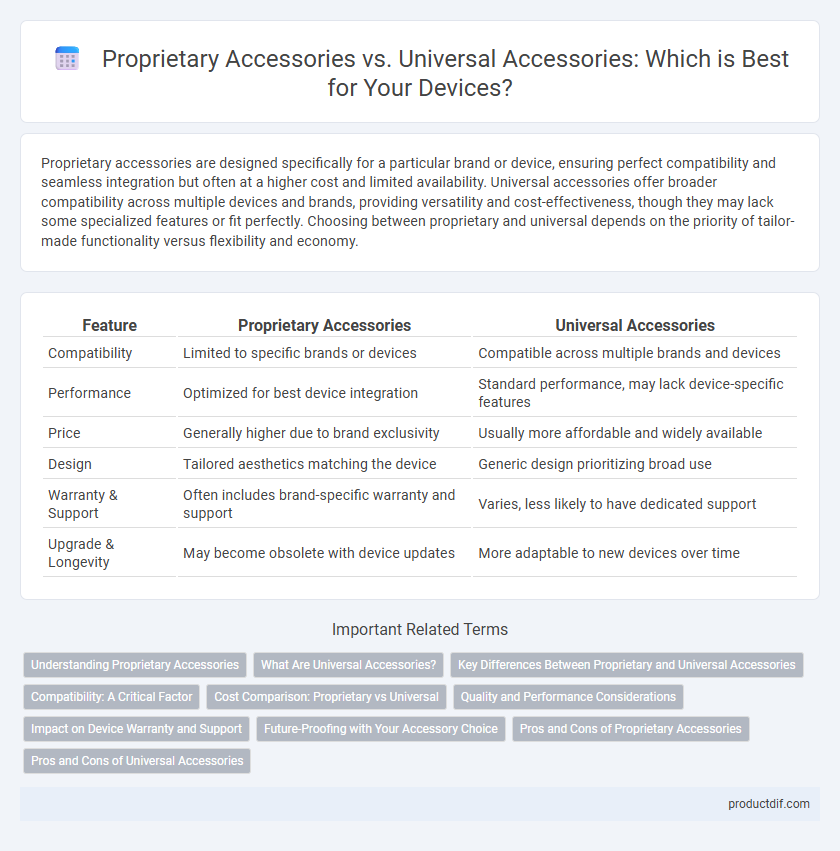Proprietary accessories are designed specifically for a particular brand or device, ensuring perfect compatibility and seamless integration but often at a higher cost and limited availability. Universal accessories offer broader compatibility across multiple devices and brands, providing versatility and cost-effectiveness, though they may lack some specialized features or fit perfectly. Choosing between proprietary and universal depends on the priority of tailor-made functionality versus flexibility and economy.
Table of Comparison
| Feature | Proprietary Accessories | Universal Accessories |
|---|---|---|
| Compatibility | Limited to specific brands or devices | Compatible across multiple brands and devices |
| Performance | Optimized for best device integration | Standard performance, may lack device-specific features |
| Price | Generally higher due to brand exclusivity | Usually more affordable and widely available |
| Design | Tailored aesthetics matching the device | Generic design prioritizing broad use |
| Warranty & Support | Often includes brand-specific warranty and support | Varies, less likely to have dedicated support |
| Upgrade & Longevity | May become obsolete with device updates | More adaptable to new devices over time |
Understanding Proprietary Accessories
Proprietary accessories are designed specifically by manufacturers to be compatible only with their own products, ensuring optimized performance and seamless integration. These accessories often utilize unique connectors and software protocols that enhance functionality but limit cross-device compatibility. Consumers must weigh the benefits of specialized features and reliability against the potential higher cost and restricted usability of proprietary options.
What Are Universal Accessories?
Universal accessories are designed to be compatible with a wide range of devices and brands, offering flexibility and convenience without the need for device-specific customization. These accessories typically include items such as chargers, cases, and mounts that adhere to standard sizes and connection types, making them versatile across different models. Their broad compatibility reduces the need for multiple accessories, providing cost efficiency and ease of replacement for consumers.
Key Differences Between Proprietary and Universal Accessories
Proprietary accessories are designed specifically for a particular brand or device, ensuring optimal compatibility and often enhanced performance due to tailored engineering. Universal accessories, by contrast, offer broad compatibility across multiple brands and devices, prioritizing versatility and cost-effectiveness over specialized features. Key differences include compatibility scope, with proprietary accessories restricted to specific products, while universal ones provide flexible use, and typically, proprietary options yield higher-quality integration with the device's hardware or software.
Compatibility: A Critical Factor
Proprietary accessories offer seamless compatibility with specific devices, ensuring optimal performance and user experience through tailored design and integrated functionality. Universal accessories provide broad compatibility across multiple brands and models, enhancing convenience and cost-effectiveness but sometimes sacrificing specialized features and precise fit. Compatibility remains a critical factor in choosing between proprietary and universal accessories, impacting device efficiency, user satisfaction, and long-term durability.
Cost Comparison: Proprietary vs Universal
Proprietary accessories often carry a higher price tag due to brand licensing and exclusive design features, whereas universal accessories benefit from competitive pricing driven by broader compatibility across multiple devices. The cost savings of universal accessories can be significant for consumers seeking functional solutions without brand-specific restrictions, making them a budget-friendly option. Despite the lower cost, proprietary accessories may offer enhanced performance or seamless integration that some users find worth the premium.
Quality and Performance Considerations
Proprietary accessories are engineered specifically for certain devices, ensuring superior compatibility, optimized performance, and adherence to stringent quality standards set by the manufacturer. Universal accessories offer broad compatibility across multiple devices but may compromise on performance precision and long-term durability due to generalized design specifications. Evaluating quality certifications and user reviews can help determine whether the customized efficiency of proprietary accessories outweighs the cost-effectiveness and flexibility of universal options.
Impact on Device Warranty and Support
Proprietary accessories often come with manufacturer certification that ensures full device warranty coverage and dedicated technical support, reducing the risk of voided warranties. Universal accessories may offer broader compatibility but can lead to warranty disputes if they cause device malfunctions, as manufacturers may not recognize them for official support claims. Choosing proprietary over universal accessories directly impacts the reliability of device warranty and the availability of authorized customer support services.
Future-Proofing with Your Accessory Choice
Proprietary accessories often provide seamless compatibility and enhanced performance tailored to specific devices, ensuring optimal user experience. Universal accessories, designed to work across various brands and models, offer greater flexibility and adaptability, reducing the need for frequent replacements. Choosing universal accessories supports future-proofing by accommodating evolving technology standards such as USB-C and Bluetooth advancements, minimizing obsolescence.
Pros and Cons of Proprietary Accessories
Proprietary accessories offer seamless compatibility and often deliver optimized performance tailored to specific devices, ensuring enhanced functionality and user experience. However, they tend to come at a higher cost and limited availability compared to universal accessories, which can restrict consumer options and increase overall expenses. The dependence on a single manufacturer for updates and replacements also poses potential risks in terms of long-term usability and compatibility.
Pros and Cons of Universal Accessories
Universal accessories offer broad compatibility across multiple devices, providing cost-effective and versatile solutions for consumers seeking flexibility. However, these accessories may lack the specialized features and optimal performance found in proprietary counterparts, potentially compromising user experience. Their generic design often results in less precise fit and durability, which can affect long-term reliability and functionality.
Proprietary accessories vs universal accessories Infographic

 productdif.com
productdif.com